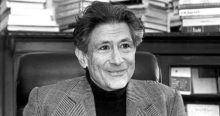On the 20th anniversary of Edward Saïd's death
Edward Wadie Saïd was born in Jerusalem on 1 November 1935, during the British Mandate, and died in New York on 25 September 2003. He was a noted academic, political activist, and literary critic, a tireless defender of the national rights of the Palestinian people. His book Orientalism was one of the most influential academic texts of the 20th century. He was also a renowned musician and pianist.
In 1947, Edward Saïd moved with his family to Cairo, where he was educated in English-speaking schools, leaving in 1951 for the United States to attend Northfield Mount Hermon School in Massachusetts. He attended Princeton University, where he graduated in 1957, and Harvard University, where he obtained a master's degree in 1960 and a doctorate in 1964, specialising in English literature.
From his doctoral thesis, he published Joseph Conrad and the Fiction of Autobiography (1966). In 1969 he became a full professor and in 1978 he published Orientalism, his best-known work, in which he criticises the false Eurocentric cultural representations of the Middle East and which has exerted enormous influence worldwide.
His books on the Middle East include The Question of Palestine (1979), Covering Islam: How the Media and the Experts Determine How We See the Rest of the World (1981), Blaming the Victims: Spurious Scholarship and the Palestinian Question (1988; co-edited with Christopher Hitchens), The Politics of Dispossession (1994), and Peace and Its Discontents: Essays on Palestine in the Middle East Peace Process (1995).
His other notable books include The World, the Text, and the Critic (1983), Nationalism, Colonialism, and Literature: Yeats and Decolonisation (1988), Musical Elaborations (1991) and Culture and Imperialism (1993). His autobiography, Out of Place (1999), reflects the ambivalence he felt living in both Western and Eastern traditions.
Edward Saïd was also a profound connoisseur of classical music, writing music criticism for The Nation and publishing several books on music. In 1999, together with Daniel Barenboim, an Israeli citizen, he founded the West-Eastern Divan Orchestra, with musicians from various Middle Eastern countries, including Palestine and Israel. The orchestra was awarded the 2012 Calouste Gulbenkian Prize.
Edward Saïd was deeply affected by the shock of the 1967 war and Israel's occupation of the whole of Palestine. In 1977 he became an independent member of the Palestinian National Council, the legislative assembly of the PLO in exile, from which he resigned in 1993 because he disagreed with the Oslo Accords. This did not prevent him from remaining a committed defender of the Palestinian cause until the end of his life.


